Machiavelli and Hobbes: Pessimistic Thinkers?
VerifiedAdded on 2023/04/07
|8
|1867
|245
AI Summary
This article examines the pessimistic views of Niccolo Machiavelli and Thomas Hobbes in their political philosophies. It explores their perspectives on power, virtue, and human nature, and discusses the similarities and differences between their theories.
Contribute Materials
Your contribution can guide someone’s learning journey. Share your
documents today.
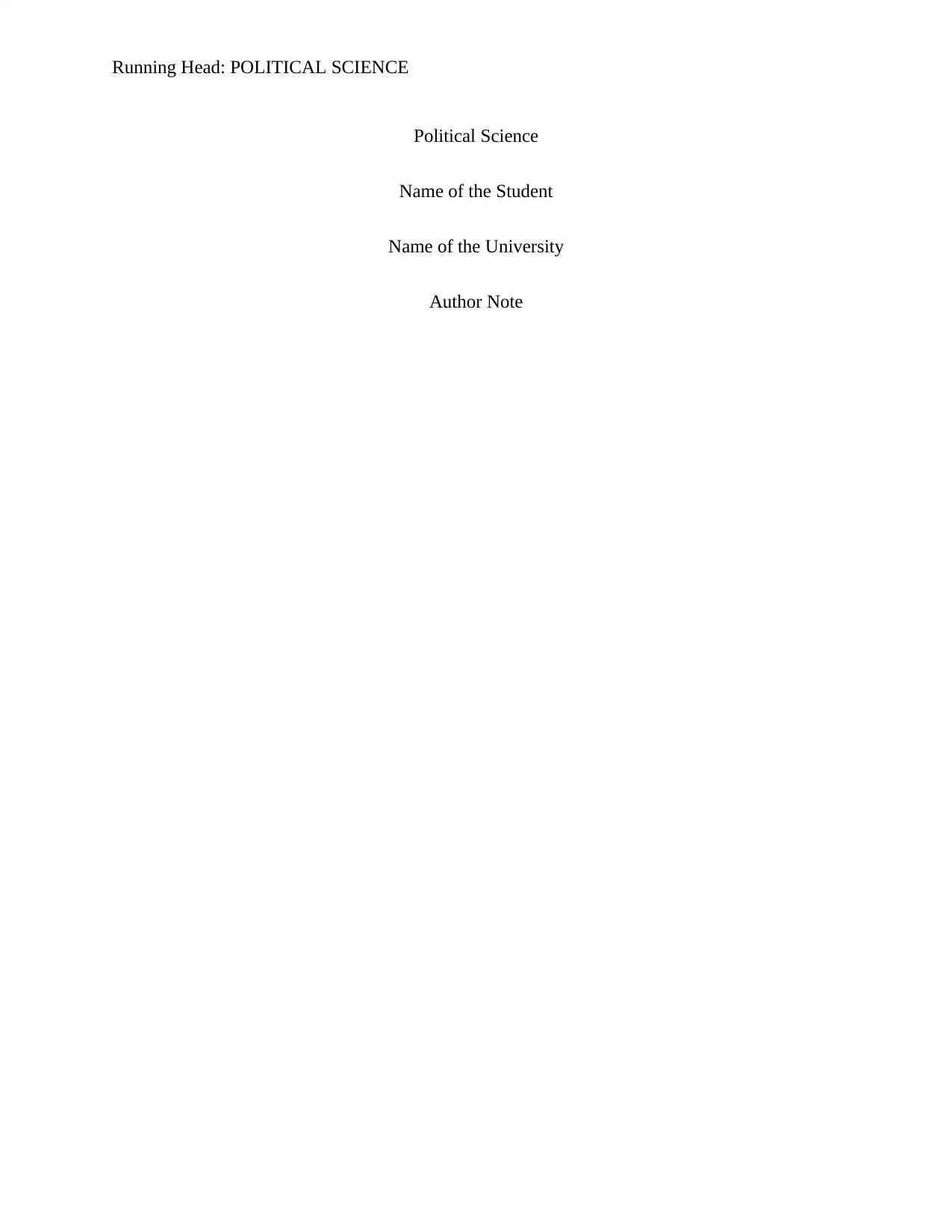
Running Head: POLITICAL SCIENCE
Political Science
Name of the Student
Name of the University
Author Note
Political Science
Name of the Student
Name of the University
Author Note
Secure Best Marks with AI Grader
Need help grading? Try our AI Grader for instant feedback on your assignments.
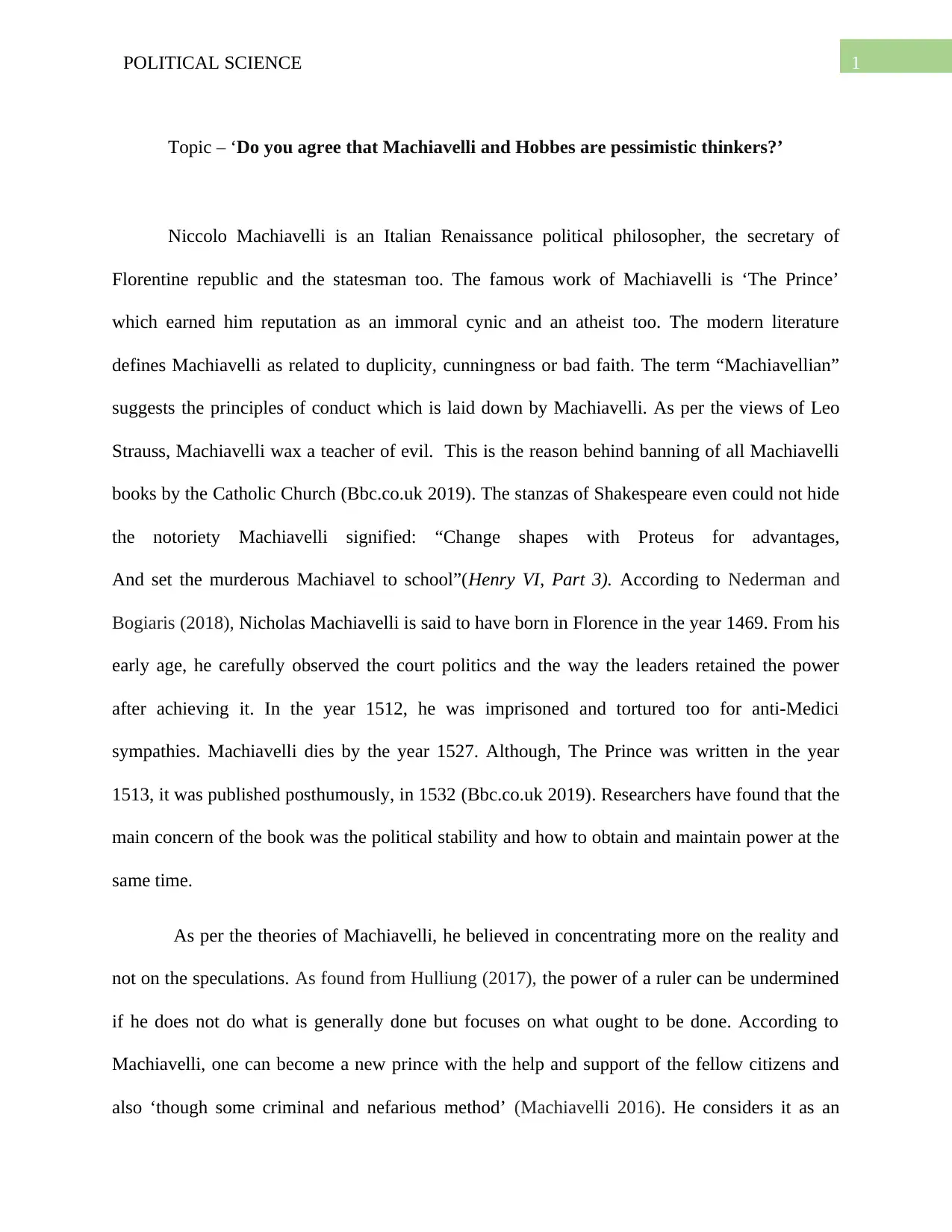
1POLITICAL SCIENCE
Topic – ‘Do you agree that Machiavelli and Hobbes are pessimistic thinkers?’
Niccolo Machiavelli is an Italian Renaissance political philosopher, the secretary of
Florentine republic and the statesman too. The famous work of Machiavelli is ‘The Prince’
which earned him reputation as an immoral cynic and an atheist too. The modern literature
defines Machiavelli as related to duplicity, cunningness or bad faith. The term “Machiavellian”
suggests the principles of conduct which is laid down by Machiavelli. As per the views of Leo
Strauss, Machiavelli wax a teacher of evil. This is the reason behind banning of all Machiavelli
books by the Catholic Church (Bbc.co.uk 2019). The stanzas of Shakespeare even could not hide
the notoriety Machiavelli signified: “Change shapes with Proteus for advantages,
And set the murderous Machiavel to school”(Henry VI, Part 3). According to Nederman and
Bogiaris (2018), Nicholas Machiavelli is said to have born in Florence in the year 1469. From his
early age, he carefully observed the court politics and the way the leaders retained the power
after achieving it. In the year 1512, he was imprisoned and tortured too for anti-Medici
sympathies. Machiavelli dies by the year 1527. Although, The Prince was written in the year
1513, it was published posthumously, in 1532 (Bbc.co.uk 2019). Researchers have found that the
main concern of the book was the political stability and how to obtain and maintain power at the
same time.
As per the theories of Machiavelli, he believed in concentrating more on the reality and
not on the speculations. As found from Hulliung (2017), the power of a ruler can be undermined
if he does not do what is generally done but focuses on what ought to be done. According to
Machiavelli, one can become a new prince with the help and support of the fellow citizens and
also ‘though some criminal and nefarious method’ (Machiavelli 2016). He considers it as an
Topic – ‘Do you agree that Machiavelli and Hobbes are pessimistic thinkers?’
Niccolo Machiavelli is an Italian Renaissance political philosopher, the secretary of
Florentine republic and the statesman too. The famous work of Machiavelli is ‘The Prince’
which earned him reputation as an immoral cynic and an atheist too. The modern literature
defines Machiavelli as related to duplicity, cunningness or bad faith. The term “Machiavellian”
suggests the principles of conduct which is laid down by Machiavelli. As per the views of Leo
Strauss, Machiavelli wax a teacher of evil. This is the reason behind banning of all Machiavelli
books by the Catholic Church (Bbc.co.uk 2019). The stanzas of Shakespeare even could not hide
the notoriety Machiavelli signified: “Change shapes with Proteus for advantages,
And set the murderous Machiavel to school”(Henry VI, Part 3). According to Nederman and
Bogiaris (2018), Nicholas Machiavelli is said to have born in Florence in the year 1469. From his
early age, he carefully observed the court politics and the way the leaders retained the power
after achieving it. In the year 1512, he was imprisoned and tortured too for anti-Medici
sympathies. Machiavelli dies by the year 1527. Although, The Prince was written in the year
1513, it was published posthumously, in 1532 (Bbc.co.uk 2019). Researchers have found that the
main concern of the book was the political stability and how to obtain and maintain power at the
same time.
As per the theories of Machiavelli, he believed in concentrating more on the reality and
not on the speculations. As found from Hulliung (2017), the power of a ruler can be undermined
if he does not do what is generally done but focuses on what ought to be done. According to
Machiavelli, one can become a new prince with the help and support of the fellow citizens and
also ‘though some criminal and nefarious method’ (Machiavelli 2016). He considers it as an
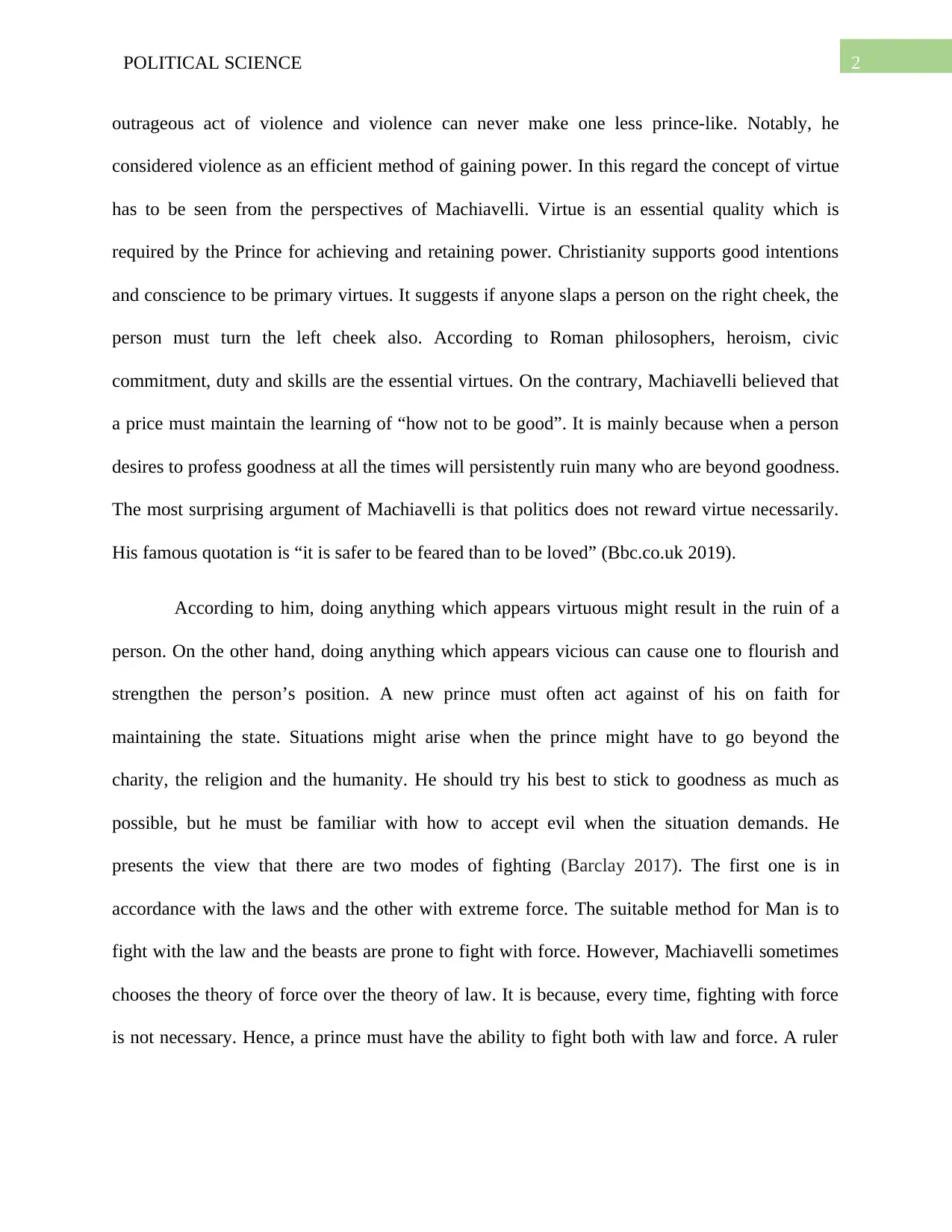
2POLITICAL SCIENCE
outrageous act of violence and violence can never make one less prince-like. Notably, he
considered violence as an efficient method of gaining power. In this regard the concept of virtue
has to be seen from the perspectives of Machiavelli. Virtue is an essential quality which is
required by the Prince for achieving and retaining power. Christianity supports good intentions
and conscience to be primary virtues. It suggests if anyone slaps a person on the right cheek, the
person must turn the left cheek also. According to Roman philosophers, heroism, civic
commitment, duty and skills are the essential virtues. On the contrary, Machiavelli believed that
a price must maintain the learning of “how not to be good”. It is mainly because when a person
desires to profess goodness at all the times will persistently ruin many who are beyond goodness.
The most surprising argument of Machiavelli is that politics does not reward virtue necessarily.
His famous quotation is “it is safer to be feared than to be loved” (Bbc.co.uk 2019).
According to him, doing anything which appears virtuous might result in the ruin of a
person. On the other hand, doing anything which appears vicious can cause one to flourish and
strengthen the person’s position. A new prince must often act against of his on faith for
maintaining the state. Situations might arise when the prince might have to go beyond the
charity, the religion and the humanity. He should try his best to stick to goodness as much as
possible, but he must be familiar with how to accept evil when the situation demands. He
presents the view that there are two modes of fighting (Barclay 2017). The first one is in
accordance with the laws and the other with extreme force. The suitable method for Man is to
fight with the law and the beasts are prone to fight with force. However, Machiavelli sometimes
chooses the theory of force over the theory of law. It is because, every time, fighting with force
is not necessary. Hence, a prince must have the ability to fight both with law and force. A ruler
outrageous act of violence and violence can never make one less prince-like. Notably, he
considered violence as an efficient method of gaining power. In this regard the concept of virtue
has to be seen from the perspectives of Machiavelli. Virtue is an essential quality which is
required by the Prince for achieving and retaining power. Christianity supports good intentions
and conscience to be primary virtues. It suggests if anyone slaps a person on the right cheek, the
person must turn the left cheek also. According to Roman philosophers, heroism, civic
commitment, duty and skills are the essential virtues. On the contrary, Machiavelli believed that
a price must maintain the learning of “how not to be good”. It is mainly because when a person
desires to profess goodness at all the times will persistently ruin many who are beyond goodness.
The most surprising argument of Machiavelli is that politics does not reward virtue necessarily.
His famous quotation is “it is safer to be feared than to be loved” (Bbc.co.uk 2019).
According to him, doing anything which appears virtuous might result in the ruin of a
person. On the other hand, doing anything which appears vicious can cause one to flourish and
strengthen the person’s position. A new prince must often act against of his on faith for
maintaining the state. Situations might arise when the prince might have to go beyond the
charity, the religion and the humanity. He should try his best to stick to goodness as much as
possible, but he must be familiar with how to accept evil when the situation demands. He
presents the view that there are two modes of fighting (Barclay 2017). The first one is in
accordance with the laws and the other with extreme force. The suitable method for Man is to
fight with the law and the beasts are prone to fight with force. However, Machiavelli sometimes
chooses the theory of force over the theory of law. It is because, every time, fighting with force
is not necessary. Hence, a prince must have the ability to fight both with law and force. A ruler
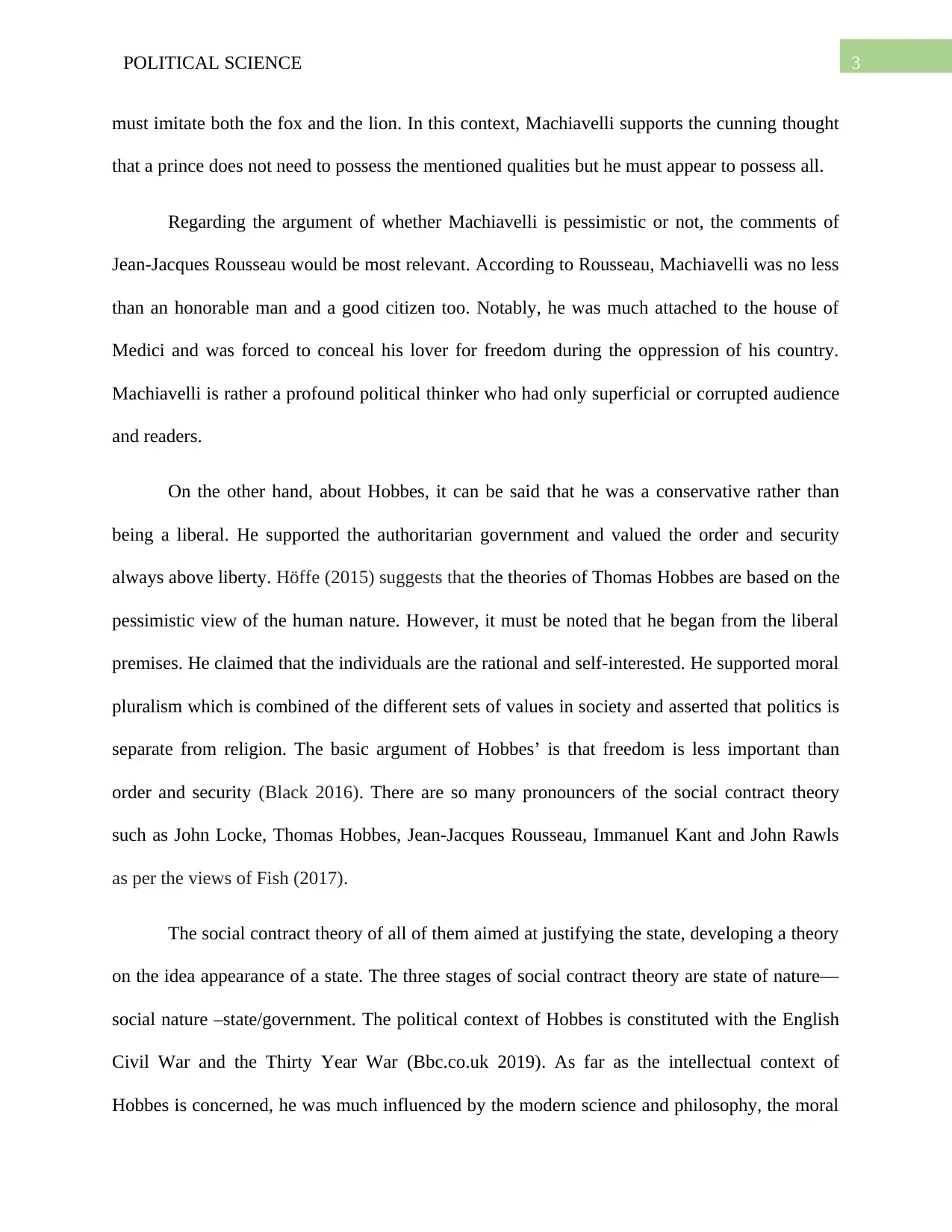
3POLITICAL SCIENCE
must imitate both the fox and the lion. In this context, Machiavelli supports the cunning thought
that a prince does not need to possess the mentioned qualities but he must appear to possess all.
Regarding the argument of whether Machiavelli is pessimistic or not, the comments of
Jean-Jacques Rousseau would be most relevant. According to Rousseau, Machiavelli was no less
than an honorable man and a good citizen too. Notably, he was much attached to the house of
Medici and was forced to conceal his lover for freedom during the oppression of his country.
Machiavelli is rather a profound political thinker who had only superficial or corrupted audience
and readers.
On the other hand, about Hobbes, it can be said that he was a conservative rather than
being a liberal. He supported the authoritarian government and valued the order and security
always above liberty. Höffe (2015) suggests that the theories of Thomas Hobbes are based on the
pessimistic view of the human nature. However, it must be noted that he began from the liberal
premises. He claimed that the individuals are the rational and self-interested. He supported moral
pluralism which is combined of the different sets of values in society and asserted that politics is
separate from religion. The basic argument of Hobbes’ is that freedom is less important than
order and security (Black 2016). There are so many pronouncers of the social contract theory
such as John Locke, Thomas Hobbes, Jean-Jacques Rousseau, Immanuel Kant and John Rawls
as per the views of Fish (2017).
The social contract theory of all of them aimed at justifying the state, developing a theory
on the idea appearance of a state. The three stages of social contract theory are state of nature—
social nature –state/government. The political context of Hobbes is constituted with the English
Civil War and the Thirty Year War (Bbc.co.uk 2019). As far as the intellectual context of
Hobbes is concerned, he was much influenced by the modern science and philosophy, the moral
must imitate both the fox and the lion. In this context, Machiavelli supports the cunning thought
that a prince does not need to possess the mentioned qualities but he must appear to possess all.
Regarding the argument of whether Machiavelli is pessimistic or not, the comments of
Jean-Jacques Rousseau would be most relevant. According to Rousseau, Machiavelli was no less
than an honorable man and a good citizen too. Notably, he was much attached to the house of
Medici and was forced to conceal his lover for freedom during the oppression of his country.
Machiavelli is rather a profound political thinker who had only superficial or corrupted audience
and readers.
On the other hand, about Hobbes, it can be said that he was a conservative rather than
being a liberal. He supported the authoritarian government and valued the order and security
always above liberty. Höffe (2015) suggests that the theories of Thomas Hobbes are based on the
pessimistic view of the human nature. However, it must be noted that he began from the liberal
premises. He claimed that the individuals are the rational and self-interested. He supported moral
pluralism which is combined of the different sets of values in society and asserted that politics is
separate from religion. The basic argument of Hobbes’ is that freedom is less important than
order and security (Black 2016). There are so many pronouncers of the social contract theory
such as John Locke, Thomas Hobbes, Jean-Jacques Rousseau, Immanuel Kant and John Rawls
as per the views of Fish (2017).
The social contract theory of all of them aimed at justifying the state, developing a theory
on the idea appearance of a state. The three stages of social contract theory are state of nature—
social nature –state/government. The political context of Hobbes is constituted with the English
Civil War and the Thirty Year War (Bbc.co.uk 2019). As far as the intellectual context of
Hobbes is concerned, he was much influenced by the modern science and philosophy, the moral
Paraphrase This Document
Need a fresh take? Get an instant paraphrase of this document with our AI Paraphraser
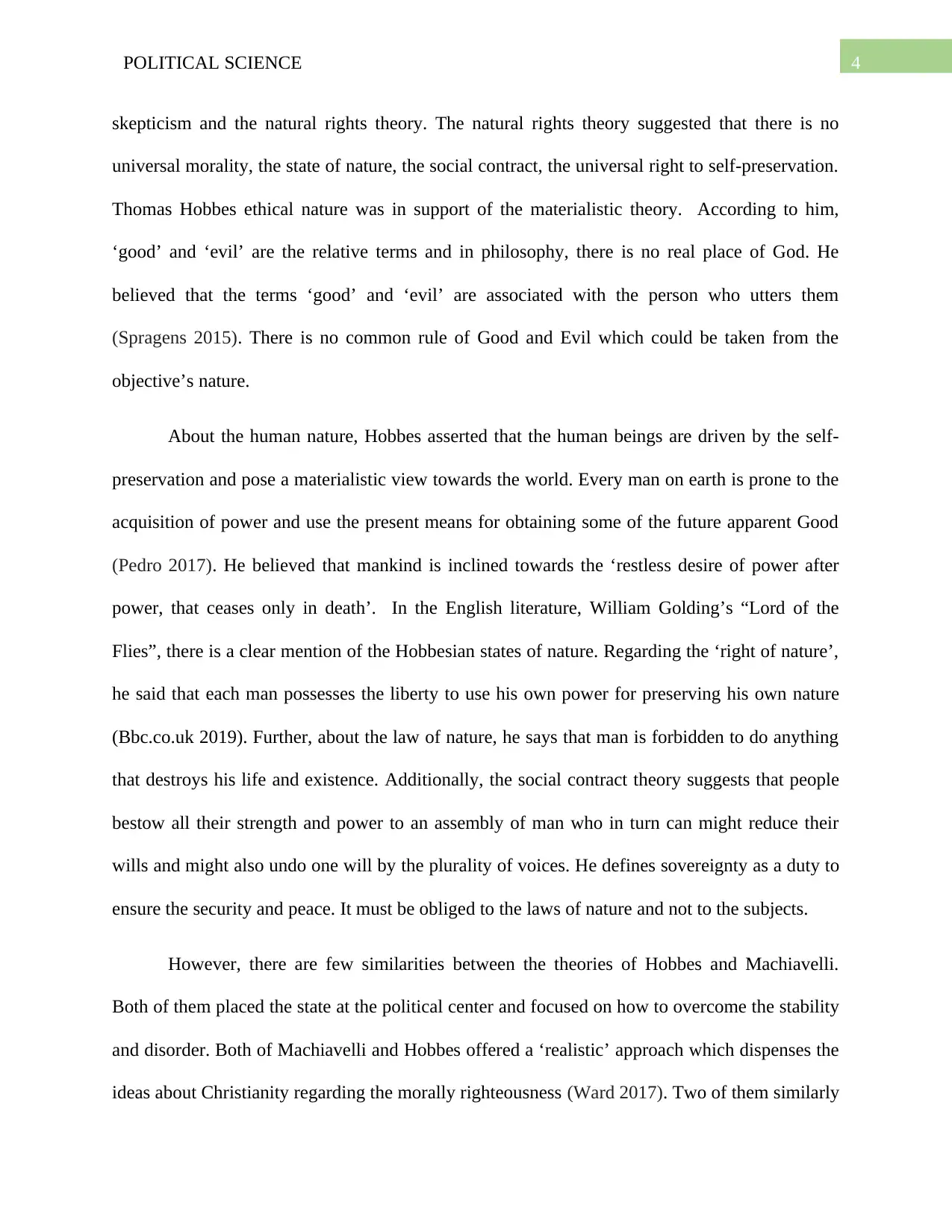
4POLITICAL SCIENCE
skepticism and the natural rights theory. The natural rights theory suggested that there is no
universal morality, the state of nature, the social contract, the universal right to self-preservation.
Thomas Hobbes ethical nature was in support of the materialistic theory. According to him,
‘good’ and ‘evil’ are the relative terms and in philosophy, there is no real place of God. He
believed that the terms ‘good’ and ‘evil’ are associated with the person who utters them
(Spragens 2015). There is no common rule of Good and Evil which could be taken from the
objective’s nature.
About the human nature, Hobbes asserted that the human beings are driven by the self-
preservation and pose a materialistic view towards the world. Every man on earth is prone to the
acquisition of power and use the present means for obtaining some of the future apparent Good
(Pedro 2017). He believed that mankind is inclined towards the ‘restless desire of power after
power, that ceases only in death’. In the English literature, William Golding’s “Lord of the
Flies”, there is a clear mention of the Hobbesian states of nature. Regarding the ‘right of nature’,
he said that each man possesses the liberty to use his own power for preserving his own nature
(Bbc.co.uk 2019). Further, about the law of nature, he says that man is forbidden to do anything
that destroys his life and existence. Additionally, the social contract theory suggests that people
bestow all their strength and power to an assembly of man who in turn can might reduce their
wills and might also undo one will by the plurality of voices. He defines sovereignty as a duty to
ensure the security and peace. It must be obliged to the laws of nature and not to the subjects.
However, there are few similarities between the theories of Hobbes and Machiavelli.
Both of them placed the state at the political center and focused on how to overcome the stability
and disorder. Both of Machiavelli and Hobbes offered a ‘realistic’ approach which dispenses the
ideas about Christianity regarding the morally righteousness (Ward 2017). Two of them similarly
skepticism and the natural rights theory. The natural rights theory suggested that there is no
universal morality, the state of nature, the social contract, the universal right to self-preservation.
Thomas Hobbes ethical nature was in support of the materialistic theory. According to him,
‘good’ and ‘evil’ are the relative terms and in philosophy, there is no real place of God. He
believed that the terms ‘good’ and ‘evil’ are associated with the person who utters them
(Spragens 2015). There is no common rule of Good and Evil which could be taken from the
objective’s nature.
About the human nature, Hobbes asserted that the human beings are driven by the self-
preservation and pose a materialistic view towards the world. Every man on earth is prone to the
acquisition of power and use the present means for obtaining some of the future apparent Good
(Pedro 2017). He believed that mankind is inclined towards the ‘restless desire of power after
power, that ceases only in death’. In the English literature, William Golding’s “Lord of the
Flies”, there is a clear mention of the Hobbesian states of nature. Regarding the ‘right of nature’,
he said that each man possesses the liberty to use his own power for preserving his own nature
(Bbc.co.uk 2019). Further, about the law of nature, he says that man is forbidden to do anything
that destroys his life and existence. Additionally, the social contract theory suggests that people
bestow all their strength and power to an assembly of man who in turn can might reduce their
wills and might also undo one will by the plurality of voices. He defines sovereignty as a duty to
ensure the security and peace. It must be obliged to the laws of nature and not to the subjects.
However, there are few similarities between the theories of Hobbes and Machiavelli.
Both of them placed the state at the political center and focused on how to overcome the stability
and disorder. Both of Machiavelli and Hobbes offered a ‘realistic’ approach which dispenses the
ideas about Christianity regarding the morally righteousness (Ward 2017). Two of them similarly
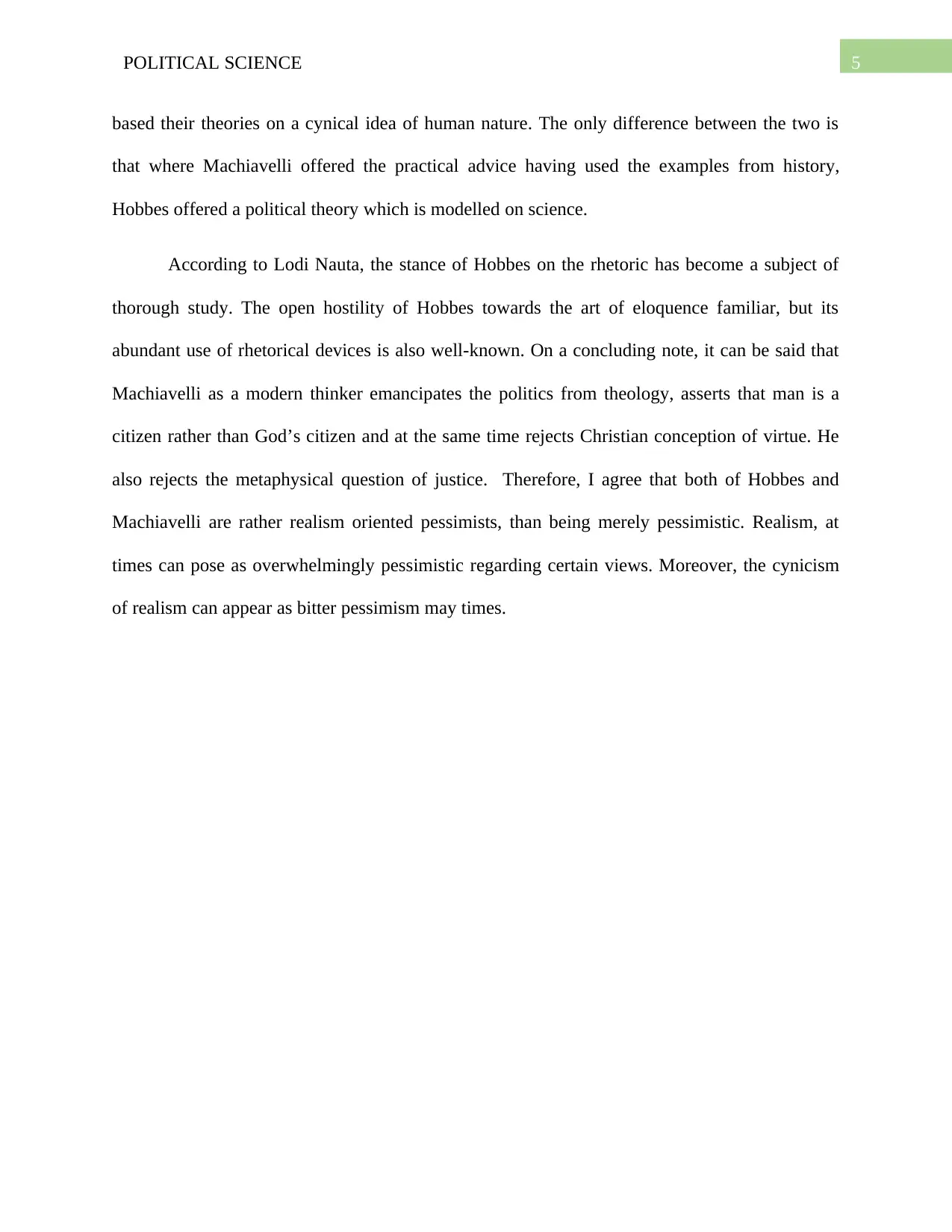
5POLITICAL SCIENCE
based their theories on a cynical idea of human nature. The only difference between the two is
that where Machiavelli offered the practical advice having used the examples from history,
Hobbes offered a political theory which is modelled on science.
According to Lodi Nauta, the stance of Hobbes on the rhetoric has become a subject of
thorough study. The open hostility of Hobbes towards the art of eloquence familiar, but its
abundant use of rhetorical devices is also well-known. On a concluding note, it can be said that
Machiavelli as a modern thinker emancipates the politics from theology, asserts that man is a
citizen rather than God’s citizen and at the same time rejects Christian conception of virtue. He
also rejects the metaphysical question of justice. Therefore, I agree that both of Hobbes and
Machiavelli are rather realism oriented pessimists, than being merely pessimistic. Realism, at
times can pose as overwhelmingly pessimistic regarding certain views. Moreover, the cynicism
of realism can appear as bitter pessimism may times.
based their theories on a cynical idea of human nature. The only difference between the two is
that where Machiavelli offered the practical advice having used the examples from history,
Hobbes offered a political theory which is modelled on science.
According to Lodi Nauta, the stance of Hobbes on the rhetoric has become a subject of
thorough study. The open hostility of Hobbes towards the art of eloquence familiar, but its
abundant use of rhetorical devices is also well-known. On a concluding note, it can be said that
Machiavelli as a modern thinker emancipates the politics from theology, asserts that man is a
citizen rather than God’s citizen and at the same time rejects Christian conception of virtue. He
also rejects the metaphysical question of justice. Therefore, I agree that both of Hobbes and
Machiavelli are rather realism oriented pessimists, than being merely pessimistic. Realism, at
times can pose as overwhelmingly pessimistic regarding certain views. Moreover, the cynicism
of realism can appear as bitter pessimism may times.
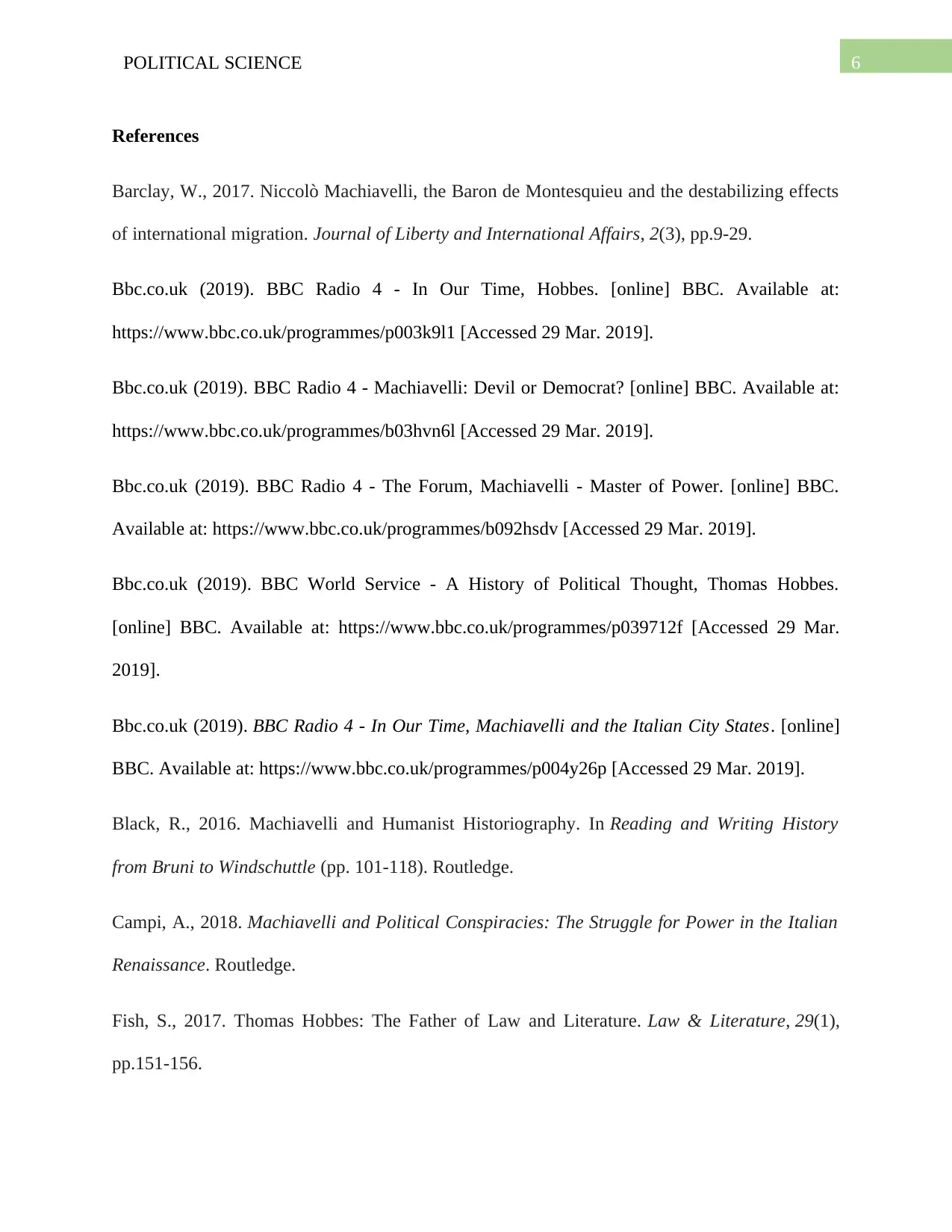
6POLITICAL SCIENCE
References
Barclay, W., 2017. Niccolò Machiavelli, the Baron de Montesquieu and the destabilizing effects
of international migration. Journal of Liberty and International Affairs, 2(3), pp.9-29.
Bbc.co.uk (2019). BBC Radio 4 - In Our Time, Hobbes. [online] BBC. Available at:
https://www.bbc.co.uk/programmes/p003k9l1 [Accessed 29 Mar. 2019].
Bbc.co.uk (2019). BBC Radio 4 - Machiavelli: Devil or Democrat? [online] BBC. Available at:
https://www.bbc.co.uk/programmes/b03hvn6l [Accessed 29 Mar. 2019].
Bbc.co.uk (2019). BBC Radio 4 - The Forum, Machiavelli - Master of Power. [online] BBC.
Available at: https://www.bbc.co.uk/programmes/b092hsdv [Accessed 29 Mar. 2019].
Bbc.co.uk (2019). BBC World Service - A History of Political Thought, Thomas Hobbes.
[online] BBC. Available at: https://www.bbc.co.uk/programmes/p039712f [Accessed 29 Mar.
2019].
Bbc.co.uk (2019). BBC Radio 4 - In Our Time, Machiavelli and the Italian City States. [online]
BBC. Available at: https://www.bbc.co.uk/programmes/p004y26p [Accessed 29 Mar. 2019].
Black, R., 2016. Machiavelli and Humanist Historiography. In Reading and Writing History
from Bruni to Windschuttle (pp. 101-118). Routledge.
Campi, A., 2018. Machiavelli and Political Conspiracies: The Struggle for Power in the Italian
Renaissance. Routledge.
Fish, S., 2017. Thomas Hobbes: The Father of Law and Literature. Law & Literature, 29(1),
pp.151-156.
References
Barclay, W., 2017. Niccolò Machiavelli, the Baron de Montesquieu and the destabilizing effects
of international migration. Journal of Liberty and International Affairs, 2(3), pp.9-29.
Bbc.co.uk (2019). BBC Radio 4 - In Our Time, Hobbes. [online] BBC. Available at:
https://www.bbc.co.uk/programmes/p003k9l1 [Accessed 29 Mar. 2019].
Bbc.co.uk (2019). BBC Radio 4 - Machiavelli: Devil or Democrat? [online] BBC. Available at:
https://www.bbc.co.uk/programmes/b03hvn6l [Accessed 29 Mar. 2019].
Bbc.co.uk (2019). BBC Radio 4 - The Forum, Machiavelli - Master of Power. [online] BBC.
Available at: https://www.bbc.co.uk/programmes/b092hsdv [Accessed 29 Mar. 2019].
Bbc.co.uk (2019). BBC World Service - A History of Political Thought, Thomas Hobbes.
[online] BBC. Available at: https://www.bbc.co.uk/programmes/p039712f [Accessed 29 Mar.
2019].
Bbc.co.uk (2019). BBC Radio 4 - In Our Time, Machiavelli and the Italian City States. [online]
BBC. Available at: https://www.bbc.co.uk/programmes/p004y26p [Accessed 29 Mar. 2019].
Black, R., 2016. Machiavelli and Humanist Historiography. In Reading and Writing History
from Bruni to Windschuttle (pp. 101-118). Routledge.
Campi, A., 2018. Machiavelli and Political Conspiracies: The Struggle for Power in the Italian
Renaissance. Routledge.
Fish, S., 2017. Thomas Hobbes: The Father of Law and Literature. Law & Literature, 29(1),
pp.151-156.
Secure Best Marks with AI Grader
Need help grading? Try our AI Grader for instant feedback on your assignments.
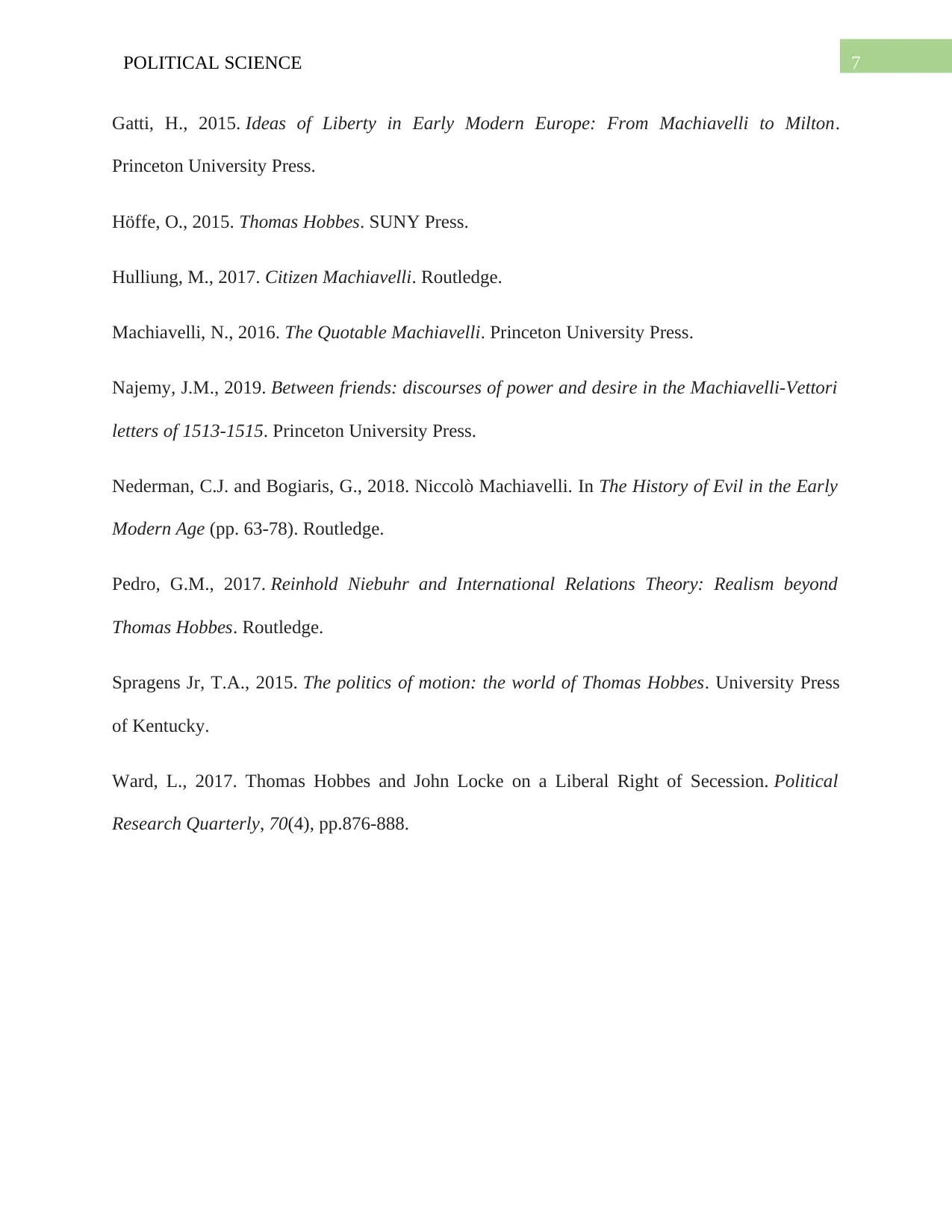
7POLITICAL SCIENCE
Gatti, H., 2015. Ideas of Liberty in Early Modern Europe: From Machiavelli to Milton.
Princeton University Press.
Höffe, O., 2015. Thomas Hobbes. SUNY Press.
Hulliung, M., 2017. Citizen Machiavelli. Routledge.
Machiavelli, N., 2016. The Quotable Machiavelli. Princeton University Press.
Najemy, J.M., 2019. Between friends: discourses of power and desire in the Machiavelli-Vettori
letters of 1513-1515. Princeton University Press.
Nederman, C.J. and Bogiaris, G., 2018. Niccolò Machiavelli. In The History of Evil in the Early
Modern Age (pp. 63-78). Routledge.
Pedro, G.M., 2017. Reinhold Niebuhr and International Relations Theory: Realism beyond
Thomas Hobbes. Routledge.
Spragens Jr, T.A., 2015. The politics of motion: the world of Thomas Hobbes. University Press
of Kentucky.
Ward, L., 2017. Thomas Hobbes and John Locke on a Liberal Right of Secession. Political
Research Quarterly, 70(4), pp.876-888.
Gatti, H., 2015. Ideas of Liberty in Early Modern Europe: From Machiavelli to Milton.
Princeton University Press.
Höffe, O., 2015. Thomas Hobbes. SUNY Press.
Hulliung, M., 2017. Citizen Machiavelli. Routledge.
Machiavelli, N., 2016. The Quotable Machiavelli. Princeton University Press.
Najemy, J.M., 2019. Between friends: discourses of power and desire in the Machiavelli-Vettori
letters of 1513-1515. Princeton University Press.
Nederman, C.J. and Bogiaris, G., 2018. Niccolò Machiavelli. In The History of Evil in the Early
Modern Age (pp. 63-78). Routledge.
Pedro, G.M., 2017. Reinhold Niebuhr and International Relations Theory: Realism beyond
Thomas Hobbes. Routledge.
Spragens Jr, T.A., 2015. The politics of motion: the world of Thomas Hobbes. University Press
of Kentucky.
Ward, L., 2017. Thomas Hobbes and John Locke on a Liberal Right of Secession. Political
Research Quarterly, 70(4), pp.876-888.
1 out of 8
![[object Object]](/_next/static/media/star-bottom.7253800d.svg)





